formerly eScholarship Editions


|
|
|
|
Your request for similar items found 20 book(s). | Modify Search | Displaying 1 - 20 of 20 book(s) | |
| 1. | 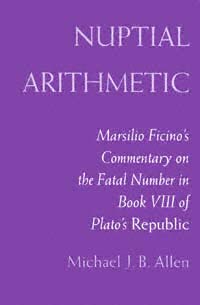 | Title: Nuptial arithmetic: Marsilio Ficino's commentary on the fatal number in Book VIII of Plato's Republic Author: Allen, Michael J. B Published: University of California Press, 1994 Subjects: Classics | Philosophy | Medieval Studies | Renaissance History Publisher's Description: The latest of Michael Allen's distinguished studies of the Renaissance Neoplatonist, Marsilio Ficino (1433-1499), presents a difficult, fascinating text. Late in his career, Ficino wrote a commentary on the intractable passage in Book VIII of Plato's Republic that concerns the mysterious geometric or "fatal" number. He was thus the first modern interpreter of this famous passage, and Allen is the first in our era to translate and elucidate his remarkable commentary.Allen's critical translation of Ficino's analysis of the fatal number passage shows how it develops philosophical, psychological, numerological, astrological, and prophetic themes that had a particular resonance at the end of the fifteenth century. [brief] Similar Items |
| 2. | 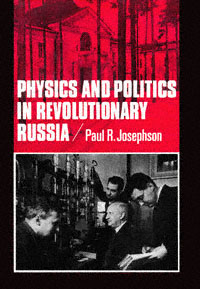 | Title: Physics and politics in revolutionary Russia Author: Josephson, Paul R Published: University of California Press, 1991 Subjects: History | History and Philosophy of Science | Russian and Eastern European Studies | Politics Publisher's Description: Aided by personal documents and institutional archives that were closed for decades, this book recounts the development of physics - or, more aptly, science under stress - in Soviet Russia up to World War II. Focusing on Leningrad, center of Soviet physics until the late 1930s, Josephson discusses the impact of scientific, cultural, and political revolution on physicists' research and professional aspirations.Political and social revolution in Russia threatened to confound the scientific revolution. Physicists eager to investigate new concepts of space, energy, light, and motion were forced to accommodate dialectical materialism and subordinate their interests to those of the state. They ultimately faced Stalinist purges and the shift of physics leadership to Moscow. This account of scientists cut off from their Western colleagues reveals a little-known part of the history of modern physics. [brief] Similar Items |
| 3. | 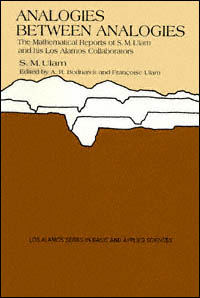 | Title: Analogies between analogies: the mathematical reports of S.M. Ulam and his Los Alamos collaborators Author: Ulam, Stanislaw M Published: University of California Press, 1990 Subjects: Science | Mathematics | Physical Sciences Similar Items |
| 4. | 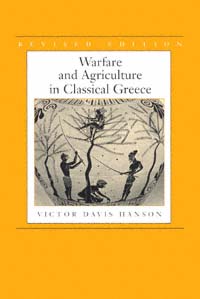 | Title: Warfare and agriculture in classical Greece Author: Hanson, Victor Davis Published: University of California Press, 1998 Subjects: Classics | Classical History | Military History | Ancient History | Classical Politics | Agriculture Publisher's Description: The ancient Greeks were for the most part a rural, not an urban, society. And for much of the Classical period, war was more common than peace. Almost all accounts of ancient history assume that farming and fighting were critical events in the lives of the citizenry. Yet never before have we had a comprehensive modern study of the relationship between agriculture and warfare in the Greek world. In this completely revised edition of Warfare and Agriculture in Classical Greece , Victor Davis Hanson provides a systematic review of Greek agriculture and warfare and describes the relationship between these two important aspects of life in ancient communities. With careful attention to agronomic as well as military details, this well-written, thoroughly researched study reveals the remarkable resilience of those farmland communities.In the past, scholars have assumed that the agricultural infrastructure of ancient society was often ruined by attack, as, for example, Athens was relegated to poverty in the aftermath of the Persian and later Peloponnesian invasions. Hanson's study shows, however, that in reality attacks on agriculture rarely resulted in famines or permanent agrarian depression. Trees and vines are hard to destroy, and grainfields are only briefly vulnerable to torching. In addition, ancient armies were rather inefficient systematic ravagers and instead used other tactics, such as occupying their enemies' farms to incite infantry battle. Warfare and Agriculture in Classical Greece suggests that for all ancient societies, rural depression and desolation came about from more subtle phenomena - taxes, changes in political and social structure, and new cultural values - rather than from destructive warfare. [brief] Similar Items |
| 5. | 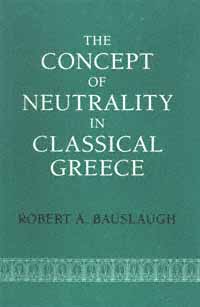 | Title: The concept of neutrality in classical Greece Author: Bauslaugh, Robert A Published: University of California Press, 1991 Subjects: Classics | Law | Classical History Publisher's Description: Looking at Classical warfare from the perspective of the non-belligerents, Robert A. Bauslaugh brings together the scattered evidence testifying to neutral behavior among the Greek city-states and their non-Greek neighbors. Were the Argives of 480/479 B.C. really "Medizers," as many have accused, or were they pursuing a justifiable policy of neutrality as they claimed? On what basis in international law or custom did the Corcyraeans claim non-alignment? Why were the leading belligerent states willing to accept the inclusion of a "neutrality clause" in the Common Peace of 371? These questions have not been asked by historians of international law, and the answers provide a far more complex and sophisticated picture of interstate relations than has so far been available.Despite the absence of exclusively diplomatic language, the concept of respect for neutrals appears early in Greek history and remains a nearly constant feature of Classical wars. The problems confronting uncommitted states, which have clear parallels in modern history, were balanced by widespread acceptance of the need for limitations on the chaos of warfare. [brief] Similar Items |
| 6. | 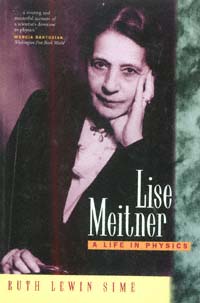 | Title: Lise Meitner: a life in physics Author: Sime, Ruth Lewin 1939- Published: University of California Press, 1997 Subjects: Science | Physics | Autobiographies and Biographies | Women's Studies | History | History and Philosophy of Science Publisher's Description: Lise Meitner (1878-1968) was a pioneer of nuclear physics and co-discoverer, with Otto Hahn and Fritz Strassmann, of nuclear fission. Braving the sexism of the scientific world, she joined the prestigious Kaiser Wilhelm Institute for Chemistry and became a prominent member of the international physics community. Of Jewish origin, Meitner fled Nazi Germany for Stockholm in 1938 and later moved to Cambridge, England. Her career was shattered when she fled Germany, and her scientific reputation was damaged when Hahn took full credit - and the 1944 Nobel Prize - for the work they had done together on nuclear fission. Ruth Sime's absorbing book is the definitive biography of Lise Meitner, the story of a brilliant woman whose extraordinary life illustrates not only the dramatic scientific progress but also the injustice and destruction that have marked the twentieth century. [brief] Similar Items |
| 7. | 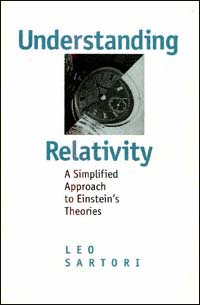 | Title: Understanding relativity: a simplified approach to Einstein's theories Author: Sartori, Leo Published: University of California Press, 1996 Subjects: Science | Physics | History and Philosophy of Science Publisher's Description: Nonspecialists with no prior knowledge of physics and only reasonable proficiency with algebra can now understand Einstein's special theory of relativity. Effectively diagrammed and with an emphasis on logical structure, Leo Sartori's rigorous but simple presentation will guide interested readers through concepts of relative time and relative space.Sartori covers general relativity and cosmology, but focuses on Einstein's theory. He tracks its history and implications. He explores illuminating paradoxes, including the famous twin paradox, the "pole-in-the-barn" paradox, and the Loedel diagram, which is an accessible, graphic approach to relativity. Students of the history and philosophy of science will welcome this concise introduction to the central concept of modern physics. [brief] Similar Items |
| 8. | 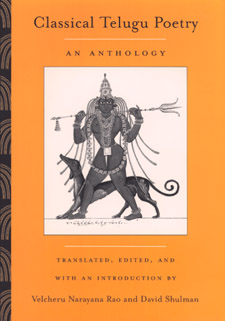 | Title: Classical Telugu poetry: an anthology Author: Nārāyaṇarāvu, Vēlcēru 1932- Published: University of California Press, 2002 Subjects: Literature | Asian Studies | Hinduism | Poetry | Folklore and Mythology | South Asia | Social Theory | Asian Literature Publisher's Description: This groundbreaking anthology opens a window on a thousand years of classical poetry in Telugu, the mellifluous language of Andhra Pradesh in southern India. The classical tradition in Telugu is one of the richest yet least explored of all South Asian literatures. This authoritative volume, the first anthology of classical Telugu poetry in English, gives an overview of one of the world's most creative poetic traditions. Velcheru Narayana Rao and David Shulman have brought together mythological, religious, and secular texts by twenty major poets who wrote between the eleventh and nineteenth centuries. The beautifully translated selections are often dramatic and unexpected in tone and effect, and sometimes highly personal. The authors have provided an informative, engaging introduction, fleshing out the history of Telugu literature, situating its poets in relation to significant literary themes and historical developments, and discussing the relationship between Telugu and the classical literature and poetry of Sanskrit. [brief] Similar Items |
| 9. | 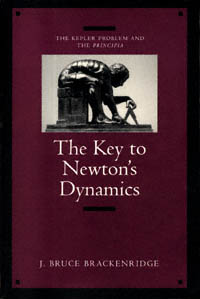 | Title: The key to Newton's dynamics: the Kepler problem and the Principia: containing an English translation of sections 1, 2, and 3 of book one from the first (1687) edition of Newton's Mathematical principles of natural philosophy Author: Brackenridge, J. Bruce 1927- Published: University of California Press, 1996 Subjects: Science | Physics | History and Philosophy of Science Publisher's Description: While much has been written on the ramifications of Newton's dynamics, until now the details of Newton's solution were available only to the physics expert. The Key to Newton's Dynamics clearly explains the surprisingly simple analytical structure that underlies the determination of the force necessary to maintain ideal planetary motion. J. Bruce Brackenridge sets the problem in historical and conceptual perspective, showing the physicist's debt to the works of both Descartes and Galileo. He tracks Newton's work on the Kepler problem from its early stages at Cambridge before 1669, through the revival of his interest ten years later, to its fruition in the first three sections of the first edition of the Principia . [brief] Similar Items |
| 10. | 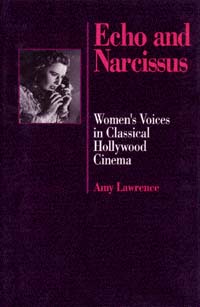 | Title: Echo and Narcissus: women's voices in classical Hollywood cinema Author: Lawrence, Amy Published: University of California Press, 1991 Subjects: Cinema and Performance Arts | Film | Women's Studies Publisher's Description: Do women in classical Hollywood cinema ever truly speak for themselves? In Echo and Narcissus , Amy Lawrence examines eight classic films to show how women's speech is repeatedly constructed as a "problem," an affront to male authority. This book expands feminist studies of the representation of women in film, enabling us to see individual films in new ways, and to ask new questions of other films.Using Sadie Thompson (1928), Blackmail (1929), Rain (1932), The Spiral Staircase , Sorry,Wrong Number , Notorious , Sunset Boulevard (1950) and To Kill a Mockingbird (1962), Lawrence illustrates how women's voices are positioned within narratives that require their submission to patriarchal roles and how their attempts to speak provoke increasingly severe repression. She also shows how women's natural ability to speak is interrupted, made difficult, or conditioned to a suffocating degree by sound technology itself. Telephones, phonographs, voice-overs, and dubbing are foregrounded, called upon to silence women and to restore the primacy of the image.Unlike the usage of "voice" by feminist and literary critics to discuss broad issues of authorship and point of view, in film studies the physical voice itself is a primary focus. Echo and Narcissus shows how assumptions about the "deficiencies" of women's voices and speech are embedded in sound's history, technology, uses, and marketing. Moreover, the construction of the woman's voice is inserted into the ideologically loaded cinematic and narrative conventions governing the representation of women in Hollywood film. [brief] Similar Items |
| 11. | 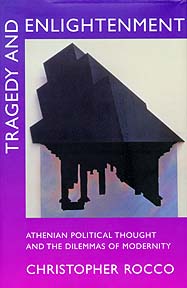 | Title: Tragedy and enlightenment: Athenian political thought, and the dilemmas of modernity Author: Rocco, Christopher 1958- Published: University of California Press, 1997 Subjects: Classics | Classical Philosophy | Classical History | Classical Literature and Language | Social and Political Thought | Social Theory Publisher's Description: Weaving together ancient Greek texts and postmodernist theory, Christopher Rocco addresses the debate between modernity and postmodernity that dominates contemporary theory. Interpreting Greek drama within a critical framework informed by contemporary theorists Foucault, Habermas, Horkheimer and Adorno, Tragedy and Enlightenment makes a sophisticated argument for the continuing relevance of the classical past, focusing on the subject of democracy.The starting point for Rocco's analysis is the impasse in contemporary political and cultural theory over the possibility and desirability of democracy in a postmodern world. After explaining the competing positions in the current debate, Rocco argues that ancient Greek tragedy and dialogue - specifically Sophocles' Oedipus , Plato's Republic and Gorgias , and Aeschylus' Oresteia - suggest alternate constructions for this and other postmodern problems.Rocco gives a detailed analysis of the contemporary divide over the theories of Jürgen Habermas and Michel Foucault and provides a provocative reading of Horkheimer and Adorno's Dialectic of Enlightenment. This original contribution to political and cultural discourse brings us to a new understanding of familiar texts and will alter the grounds of debate for students and scholars of the classical and the contemporary worlds. [brief] Similar Items |
| 12. | 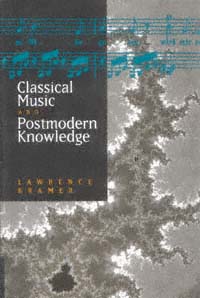 | Title: Classical music and postmodern knowledge Author: Kramer, Lawrence 1946- Published: University of California Press, 1995 Subjects: Music | Musicology Publisher's Description: A leading cultural theorist and musicologist opens up new possibilities for understanding mainstream Western art music - the "classical" music composed between the eighteenth and early twentieth centuries that is, for many, losing both its prestige and its appeal. When this music is regarded esoterically, removed from real-world interests, it increasingly sounds more evasive than transcendent. Now Lawrence Kramer shows how classical music can take on new meaning and new life when approached from postmodernist standpoints.Kramer draws out the musical implications of contemporary efforts to understand reason, language, and subjectivity in relation to concrete human activities rather than to universal principles. Extending the rethinking of musical expression begun in his earlier Music as Cultural Practice , he regards music not only as an object that invites aesthetic reception but also as an activity that vitally shapes the personal, social, and cultural identities of its listeners.In language accessible to nonspecialists but informative to specialists, Kramer provides an original account of the postmodernist ethos, explains its relationship to music, and explores that relationship in a series of case studies ranging from Haydn and Mendelssohn to Ives and Ravel. [brief] Similar Items |
| 13. | 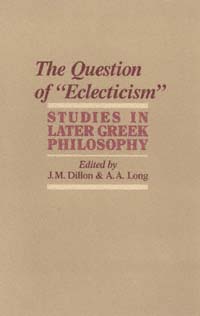 | Title: The Question of "eclecticism": studies in later Greek philosophy Author: Dillon, John M Published: University of California Press, 1988 Subjects: Classics | Classical Philosophy | Social and Political Thought Publisher's Description: This collection of essays is addressed to the growing number of philosophers, classicists, and intellectual historians who are interested in the development of Greek thought after Aristotle. In nine original studies, the authors explore the meaning and history of "eclecticism" in the context of ancient philosophy. The book casts fresh light on the methodology of such central figures as Cicero, Philo, Plutarch, Sextus Empiricus, and Ptolemy, and also illuminates many of the conceptual issues discussed most creatively in this period. [brief] Similar Items |
| 14. | 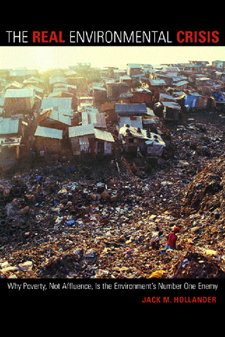 | Title: The real environmental crisis: why poverty, not affluence, is the environment's number one enemy Author: Hollander, Jack M Published: University of California Press, 2003 Subjects: EcologyEvolutionEnvironment | Conservation | Politics | Social Science | Politics Publisher's Description: Drawing a completely new road map toward a sustainable future, Jack M. Hollander contends that our most critical environmental problem is global poverty. His balanced, authoritative, and lucid book challenges widely held beliefs that economic development and affluence pose a major threat to the world's environment and resources. Pointing to the great strides that have been made toward improving and protecting the environment in the affluent democracies, Hollander makes the case that the essential prerequisite for sustainability is a global transition from poverty to affluence, coupled with a transition to freedom and democracy. The Real Environmental Crisis takes a close look at the major environment and resource issues - population growth; climate change; agriculture and food supply; our fisheries, forests, and fossil fuels; water and air quality; and solar and nuclear power. In each case, Hollander finds compelling evidence that economic development and technological advances can relieve such problems as food shortages, deforestation, air pollution, and land degradation, and provide clean water, adequate energy supplies, and improved public health. The book also tackles issues such as global warming, genetically modified foods, automobile and transportation technologies, and the highly significant Endangered Species Act, which Hollander asserts never would have been legislated in a poor country whose citizens struggle just to survive. Hollander asks us to look beyond the media's doomsday rhetoric about the state of the environment, for much of it is simply not true, and to commit much more of our resources where they will do the most good - to lifting the world's population out of poverty. [brief] Similar Items |
| 15. | 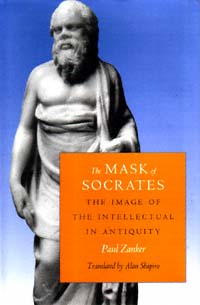 | Title: The mask of Socrates: the image of the intellectual in antiquity Author: Zanker, Paul Published: University of California Press, 1996 Subjects: Classics | Art History | Art and Architecture | Ancient History Publisher's Description: This richly illustrated work provides a new and deeper perspective on the interaction of visual representation and classical culture from the fifth century B.C. to the fourth century A.D. Drawing on a variety of source materials such as Graeco-Roman literature, historiography, and philosophy, in addition to artistic renderings, Paul Zanker forges the first comprehensive history of the visual representation of Greek and Roman intellectuals. He takes the reader from the earliest visual images of Socrates and Plato to the figures of Christ, the Apostles, and contemporaneous pagan and civic dignitaries.Through his interpretations of postures, gestures, facial expressions, and stylistic changes of particular set pieces, we come to know these great poets and philosophers through all of their various personas - the prophetic wise man, the virtuous democratic citizen, or the self-absorbed bon vivant. Zanker's analysis of how the iconography of influential thinkers and writers changed demonstrates the rise and fall of trends and the movement of schools of thought and belief, each successively embodying the most valued characteristics of the period and culture. [brief] Similar Items |
| 16. | 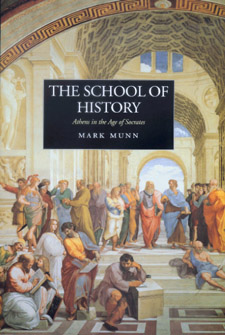 | Title: The school of history: Athens in the age of Socrates Author: Munn, Mark Henderson Published: University of California Press, 2000 Subjects: Classics | Classical History | Ancient History | Classical Politics Publisher's Description: History, political philosophy, and constitutional law were born in Athens in the space of a single generation--the generation that lived through the Peloponnesian War (431-404 b.c.e.). This remarkable age produced such luminaries as Socrates, Herodotus, Thucydides, Sophocles, Euripides, Aristophanes, and the sophists, and set the stage for the education and early careers of Plato and Xenophon, among others. The School of History provides the fullest and most detailed intellectual and political history available of Athens during the late fifth century b.c.e., as it examines the background, the context, and the decisive events shaping this society in the throes of war. This expansive, readable narrative ultimately leads to a new understanding of Athenian democratic culture, showing why and how it yielded such extraordinary intellectual productivity. As both a source and a subject, Thucydides' history of the Peloponnesian War is the central text around which the narrative and thematic issues of the book revolve. Munn re-evaluates the formation of the Greek historiographical tradition itself as he identifies the conditions that prompted Thucydides to write--specifically the historian's desire to guide the Athenian democracy as it struggled to comprehend its future. The School of History fully encompasses recent scholarship in history, literature, and archaeology. Munn's impressive mastery of the huge number of sources and publications informs his substantial contributions to our understanding of this democracy transformed by war. Immersing us fully in the intellectual foment of Athenian society, The School of History traces the history of Athens at the peak of its influence, both as a political and military power in its own time and as a source of intellectual inspiration for the centuries to come. [brief] Similar Items |
| 17. | 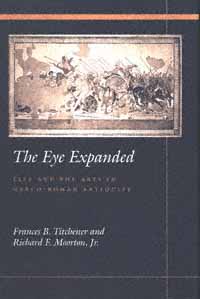 | Title: The eye expanded: life and the arts in Greco-Roman antiquity Author: Titchener, Frances B 1954- Published: University of California Press, 1999 Subjects: Classics | Classical History | Classical Literature and Language | Art and Architecture | Classical Politics | Classical Religions | Ancient History Publisher's Description: Plato and Aristotle both believed that the arts were mimetic creations of the human mind that had the power to influence society. In this they were representative of a widespread consensus in ancient culture. Cultural and political impulses informed the fine arts, and these in turn shaped - and were often intended to shape - the living world. The contributors to this volume, all of whom have been encouraged and inspired by the work of Peter Green, document the interaction between life and the arts that has made art more lively and life more artful in sixteen essays with subjects ranging from antiquity to modern times.With topics ranging from Antigone to D. H. Lawrence and Norman Douglas, and from Bactrian coins to Livy's characterization of women, the scope, the zest, and the scholarship of these essays will illuminate new avenues in our understanding of the relationship between classics and culture, and in our appreciation of both the artistic products that have come down to us and the varieties of life from which they spring. [brief] Similar Items |
| 18. | 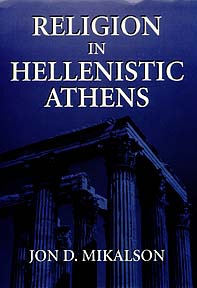 | Title: Religion in Hellenistic Athens Author: Mikalson, Jon D 1943- Published: University of California Press, 1998 Subjects: Classics | Classical Religions | Religion | Ancient History Publisher's Description: Until now, there has been no comprehensive study of religion in Athens from the end of the classical period to the time of Rome's domination of the city. Jon D. Mikalson provides a chronological approach to religion in Hellenistic Athens, disproving the widely held belief that Hellenistic religion during this period represented a decline from the classical era. Drawing from epigraphical, historical, literary, and archaeological sources, Mikalson traces the religious cults and beliefs of Athenians from the battle of Chaeroneia in 338 B.C. to the devastation of Athens by Sulla in 86 B.C., demonstrating that traditional religion played a central and vital role in Athenian private, social, and political life. Mikalson describes the private and public religious practices of Athenians during this period, emphasizing the role these practices played in the life of the citizens and providing a careful scruntiny of individual cults. He concludes his study by using his findings from Athens to call into question several commonly held assumptions about the general development of religion in Hellenistic Greece. [brief] Similar Items |
| 19. | 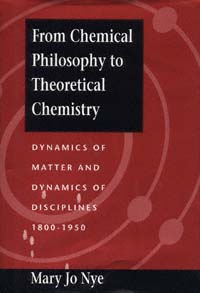 | Title: From chemical philosophy to theoretical chemistry: dynamics of matter and dynamics of disciplines, 1800-1950 Author: Nye, Mary Jo Published: University of California Press, 1994 Subjects: Science | History and Philosophy of Science | Physical Sciences | Physics Publisher's Description: How did chemistry and physics acquire their separate identities, and are they on their way to losing them again? Mary Jo Nye has written a graceful account of the historical demarcation of chemistry from physics and subsequent reconvergences of the two, from Lavoisier and Dalton in the late eighteenth century to Robinson, Ingold, and Pauling in the mid-twentieth century.Using the notion of a disciplinary "identity" analogous to ethnic or national identity, Nye develops a theory of the nature of disciplinary structure and change. She discusses the distinctive character of chemical language and theories and the role of national styles and traditions in building a scientific discipline. Anyone interested in the history of scientific thought will enjoy pondering with her the question of whether chemists of the mid-twentieth century suspected chemical explanation had been reduced to physical laws, just as Newtonian mechanical philosophers had envisioned in the eighteenth century. [brief] Similar Items |
| 20. | 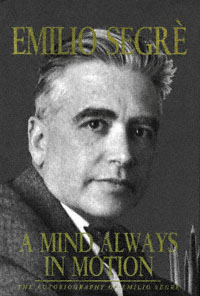 | Title: A mind always in motion: the autobiography of Emilio Segrè Author: Segrè, Emilio Published: University of California Press, 1993 Subjects: Science | History and Philosophy of Science | Physics | Autobiography Publisher's Description: The renowned physicist Emilio Segrè (1905-1989) left his memoirs to be published posthumously because, he said, "I tell the truth the way it was and not the way many of my colleagues wish it had been." This compelling autobiography offers a personal account of his fascinating life as well as candid portraits of some of this century's most important scientists, such as Enrico Fermi, E. O. Lawrence, and Robert Oppenheimer.Born in Italy to a well-to-do Jewish family, Segrè showed early signs of scientific genius - at age seven he began a notebook of physics experiments. He became Fermi's first graduate student in 1928 and contributed to the discovery of slow neutrons, and later was appointed director of the physics laboratory at the University of Palermo. While visiting the Radiation Laboratory at Berkeley in 1938, he learned that he had been dismissed from his Palermo post by Mussolini's Fascist regime. Lawrence then hired him to work on the cyclotron at Berkeley with Luis Alvarez, Edwin McMillan, and Glenn Seaborg. Segrè was one of the first to join Oppenheimer at Los Alamos, where he became a group leader on the Manhattan Project. His account of that mysterious enclave of scientists, all working feverishly to develop the atomic bomb before the Nazis did, includes his description of the first explosion at Alamogordo.Segrè writes movingly of the personal devastation wrought by the Nazis, his struggles with fellow scientists, and his love of nature. His book offers an intimate glimpse into a bygone era as well as a unique perspective on some of the most important scientific developments of this century. [brief] Similar Items |